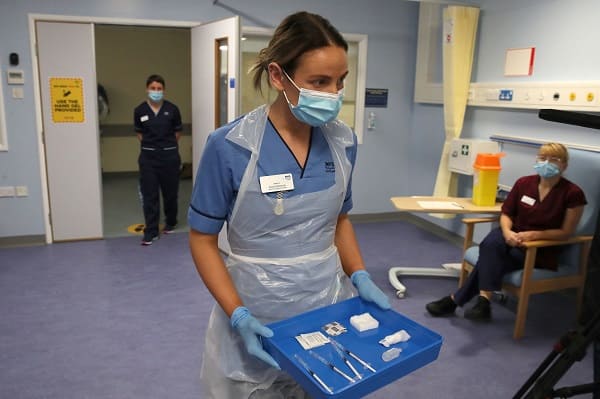Research suggests the new Wegovy weight-loss jab helps people shed over 10% of their bodyweight and can reduce the risk of strokes and heart attacks.
However, a leading testing expert warns UK treatments have only been approved for a maximum of two years and may be a temporary solution for a chronic problem. Long-term, lifestyle changes and testing for underlying health issues are key.
Stocks of the eagerly-awaited weight-loss jab Wegovy have finally arrived in the UK. The injection will be offered by specialist NHS weight-loss management services, as well as some private clinics. Its arrival coincides with its makers, Novo Nordisk, becoming Europe’s wealthiest company. At the close of trading on Monday, the firm had a stock market valuation of $428bn (£339bn).
Prime Minister Rishi Sunak has said the arrival of weight-loss jabs such as Wegovy are a ‘game changer’, and the latest research suggests the new jab can help people shed over 10% of their bodyweight and may reduce the risk of strokes and heart attacks.
However, a testing expert says limits placed on Wegovy’s prescription in the UK mean it is only a short-term solution, and not the magic bullet to solve Britain’s obesity epidemic.
Leading testing expert, Dr Avinash Hari Narayanan (MBChB), Clinical Lead at London Medical Laboratory said, ‘It’s very concerning that nearly 1-in-3 adults are obese in the UK, the highest level in Europe. Obesity is strongly associated with high blood pressure, elevated cholesterol levels and diabetes, all strong markers for life-changing conditions including stroke and coronary artery disease.
‘There’s no doubt the drug semaglutide – of which Wegovy is a brand name – is an effective and remarkable clinical intervention for patients. It works by reducing appetite through increasing satiety and fullness, resulting in reduced food consumption. In research, 75% of users lost over 10% of their bodyweight and more than 30% lost over 20% of their bodyweight.
‘However, it’s vital to remember that this new jab is no miracle cure. It addresses obesity as a symptom but not necessarily the underlying cause.
Furthermore, not everyone who wants the drug will qualify for NHS treatment, and its use here in the UK may only be short-term. In March, the National Institute for Care and Excellence (NICE), the body which approves drugs for use in England, approved Wegovy for NHS use for people with a BMI of 35 or more and at least one weight-related health condition. It also stipulated weekly injection treatments should be used for a “maximum” of two years. That’s a key therapeutic window but, potentially, it poses a longer-term problem for patients.
‘Some experts say that NICE’s two-year limit is simply a cost-cutting measure, as semaglutide is in short supply and could present a considerable new expense for the NHS.
Whatever the cause of the two-year limit, it represents a potential hurdle for patients in their weight-loss journey. Research published last year in the journal “Diabetes, Obesity and Metabolism” found that patients regained two-thirds of their lost weight a year after treatment with semaglutide was stopped.
‘Here in the UK, NHS treatments are being run in conjunction with a reduced calorie diet and exercise plans. A holistic approach that helps treat the root cause of obesity is eminently sensible, enabling patients to be less reliant on the drug in the long-term. It’s about looking in-depth at people’s lifestyles, metabolism and mental health, to identify potential underlying issues that can be remedied.
‘However, private prescriptions for Wegovy are likely to be less strict than for NHS patients. It should be the case that private health providers offer the same holistic treatment as NHS practices. It’s vital Wegovy is never offered in isolation but is always part of a wider spectrum of treatments and lifestyle changes that address the underlying causes of weight issues.
‘‘NICE says the list price for a month’s supply ranges from £73.25 to £175.80 plus VAT, depending on the dose. The discounted price the NHS pays has not been revealed. Reuters reports the UK’s Simple Online Pharmacy’s private treatments will cost £199-£299 a month. In the US, semaglutide injections reportedly cost $1,000 a month or more.
‘In conjunction with losing weight, people can gain essential insight into dietary issues and general health by taking a simple, one-off blood test. As just one example, London Medical Laboratory’s own Well Person Profile blood test examines blood cells, cholesterol, diabetes, gout, iron studies, kidney & liver function, muscle & bone health and thyroid problems. This gives insight not only into people’s diets, but also into how well they metabolise food and any underlying potential medical issues behind weight gains.
‘Given the current lack of long-term treatment options using semaglutide in England, it may be more cost-effective for the NHS to concentrate on the underlying cause of weight issues, rather than simply treating the symptoms. London Medical Laboratory’s Well Person Profile test can be taken at home through the post, or at one of the many drop-in clinics that offer these tests across London and nationwide in over 95 selected pharmacies and health stores.’


Leave a Comment